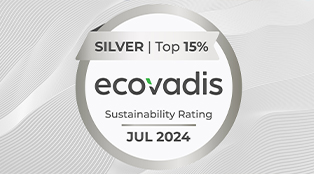
From the Leader's Desk
With increasing potential for the U.S. BIOSECURE Act to be signed into law, there has been growing interest from both large pharma and emerging biopharma/biotech in Indian CROs/CDMOs offering a China-independent alternative for securing robust supply chains. Although the shift is expected to be gradual given the proscribed eight-year timeline, companies like Syngene are already experiencing notable increases in inquiries, visits, audits, and requests for proposals.
Offering therapeutic area and modality agnostic capabilities across the discovery-development-manufacturing value chain, Syngene is well-positioned to provide these increasingly sought-after services.
In other news, we are thrilled to share that Syngene's greenhouse gas (GHG) emissions reduction targets have been officially validated by the Science Based Targets initiative (SBTi), demonstrating our commitment to the rigorous SBTi criteria and recommendations. Our Scope 1 and 2 targets are aligned with the Paris Agreement objective to limit global warming to 1.5° above pre-industrial levels. Syngene therefore joins the group of over 7000 companies taking action by setting emission reduction targets in line with climate science.
We are also delighted to announce that Syngene recently won the Asia Pacific Biologics CMO Excellence Award 2024.
Happy reading.

Best regards,
Kenneth J. Barr, Ph.D.
Senior Vice President, Discovery Services
Syngene International Ltd.

Accolades
Syngene achieves silver in EcoVadis ESG assessment
A prestigious silver rating in the EcoVadis sustainability index has placed Syngene among the top 15% of companies globally, highlighting our strong commitment to sustainability. The EcoVadis assessment evaluates companies in four dimensions: environment, social, ethics, and sustainable procurement. This achievement reflects the company's broader focus on providing scientific solutions to clients while respecting the planet and the needs of communities today and in the future.

In the Spotlight
Nordics Discovery: A scientific symposium on preclinical research
Our inaugural European symposium provided a platform for exploring the latest advancements in preclinical research and drug discovery. Syngene experts Ralf Guenther and Miquel Salva shared valuable insights on designing bispecific antibodies for cancer treatment and strategies for integrating DMPK and safety considerations in drug development. The talks also featured case studies demonstrating the value we bring to our clients. More details about the topics covered and the experts in the link below.

Case Study
How Syngene supported a biotech company in developing a bile acid modulator for treating cholestatic diseases
In a recent collaboration, we partnered with a biotech company to tackle the challenge of developing a bile acid modulator for cholestatic diseases. The goal was to reduce bile acid buildup without the unwanted side effects of diarrhea. Using a ligand-based design approach in medicinal chemistry and an intensive screening process, we identified a promising lead compound that has now progressed to preclinical trials. This marks a breakthrough in liver disease treatment, offering hope to millions of patients around the world.

Blog
Innovation at Syngene: Translatable models for improving cancer research
In cancer research, accurate experimental models are crucial for predicting the success of new therapies. Orthotopic tumor models, animal models made from 3D culture of human cell lines (spheroids), and patient-derived cancer tissues (organoids) offer a better understanding of cancer biology and translatability than traditional cell line derived subcutaneous tumor models.
Syngene has developed various orthotopic models validated against the standard of care and tumor models with 3D culture. These models can help improve translatability and clinical relevance for patient usage.
Biocon Park, SEZ, Bommasandra Industrial Area - Phase-IV Bangalore 560099 India
click here to update your email preferences







